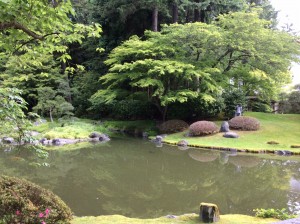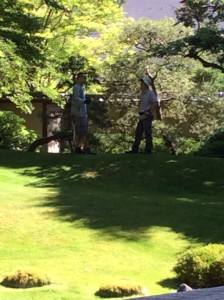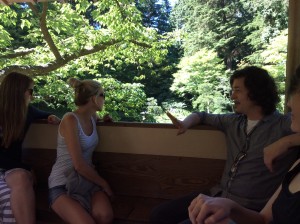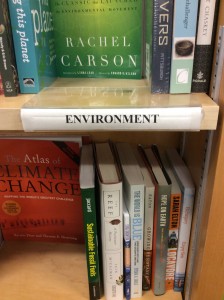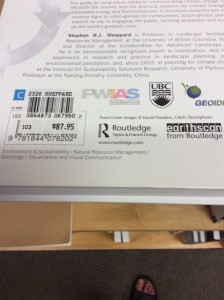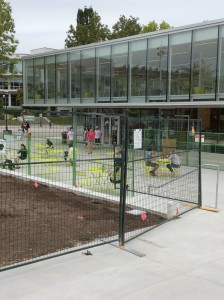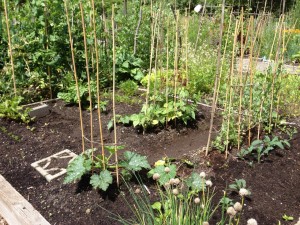No wifi at all in this little hut, and I find I do better with recalling the daily readings with less of the supersonic noise to worry about. Strange how the sun make things quieter, more bugs skitter across the pond, and more koi make the blooping sound whenever they grab one of them for their lunch. But when the clouds cast a shadow over Nitobi Gardens, the trucks, cars and construction vehicles intrude on the meditative serenity. Even in Arcadia… planes fly overhead. But each time I look away from my iPad, I can hear the gardners raking the gravel on e path, birds twittering and even a koi blooping. Just like that koi pond app I have on my iPhone, that lets the user release buzzing dragonflies so they can be swatted into the water, producing an electronic bloop. Yes, the actual ones are more surprising. And the bee buzzing around my carrier bag more of a threat than its digital counterpart, but I will let it be.
The gas-powered weedwhacker has just revved up, so much for serenity, but a good point to raise the issue presented in Garrett Hardin’s Tragedy, where a plus one for someone is a minus one ninth, or less, for everyone else. The ear-muffled gardener gains from using the gas-powered tool as it will save him time trimming the grass, and now he can go back to more contemplative raking. It is only a mild, temporary disturbance for me and the other few garden visitors presently strolling around. Considering that I can access Nitobi for free with my student card, I shouldn’t be complaining at all. When I lived in Kanazawa, I had a similar card: Alien Registration that announced I was not a resident (some would joke about not being a human either) but through some strange loophole it allowed me to access Kenrokuen for free on Sundays. My friendly Cascadian coworker took advantage of this situation to bring his toddler son there every weekend, to poke his pudgy fingers into the koi’s mouth (they spit water at you when poked, much to this toddler’s delight). When my parents came to visit, we had to pay up the 300 yen per person, a small price to pay (close enough to three bucks), and now it is the same when I go back to visit Kanazawa: more of an alien without the registration! This same nominal fee applies to everyone Monday to Saturday, and it helps keep the gardening staff, the tea house purveyors and other operations running as they should. When my mum was strolling around, see commented on how it would be a perfect job for the elderly, sweeping gravel back onto the path and trimming the stray twig into a more aesthetically-pleasing form. Pay would hardly be anything at all, but the pleasure of being in a commons, untouched by development, must make up for it. “Anything,” Hardin writes, “over and above merely staying alive will be defined as work” (p. 175) and I could picture my mum enjoying this calm serenity in her golden years.
Of course, business (or rather busy-ness) always gets in the way, and presently my “work” has me juggling a tutoring job in West Vancouver, a community assistant job in Acadia plus a graduate peer advisor job for the department, in addition to anything else that will help me pay rent for the next couple of month before the remote chance of a scholarship pays out. With the possible exception of a bus pass which helps me get to Dundarave for my tutoring, the only other benefit my student card provides is access to Nitobi and library books. Small comforts, but comforts indeed, for paying the ever-increasing amounts of tuition and student fees, so that the university can build more concrete and glass edifices (not-so sustainable structures we were told last class). All of my studies seem to be working towards my return as a registered alien to Kenrokuen, hopefully as a retired Dean of something who enjoys raking the gravel and tying up the yukitsuri for the beautiful winters ahead.
